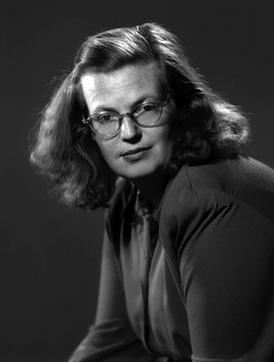
Shirley Hardie Jackson was an American writer known primarily for her works of horror and mystery. Over the duration of her writing career, which spanned over two decades, she composed six novels, two memoirs, and more than 200 short stories.

John Henry O'Hara was one of America's most prolific writers of short stories, credited with helping to invent The New Yorker magazine short story style. He became a best-selling novelist before the age of 30 with Appointment in Samarra and BUtterfield 8. While O'Hara's legacy as a writer is debated, his champions rank him highly among the under-appreciated and unjustly neglected major American writers of the 20th century. Few college students educated after O'Hara's death in 1970 have discovered him, chiefly because he refused to allow his work to be reprinted in anthologies used to teach literature at the college level.
"The Lottery" is a short story by Shirley Jackson that was first published in The New Yorker on June 26, 1948. The story describes a fictional small American community which observes an annual tradition known as "the lottery", which is intended to ensure a good harvest and purge the town of bad omens. The lottery, its preparations, and its execution are all described in detail, though it is not revealed until the end what actually happens to the person selected by the random lottery: the selected member of the community is stoned to death by the other townspeople.
"The Secret Life of Walter Mitty" (1939) is a short story by James Thurber. The most famous of Thurber's stories, it first appeared in The New Yorker on March 18, 1939, and was first collected in his book My World and Welcome to It. It has since been reprinted in James Thurber: Writings and Drawings, is available on-line on the New Yorker website, and is one of the most anthologized short stories in American literature. The story is considered one of Thurber's "acknowledged masterpieces". It was made into a 1947 film of the same name, with Danny Kaye in the title role, though the film is very different from the original story. It was also adapted into a 2013 film, which is again very different from the original.
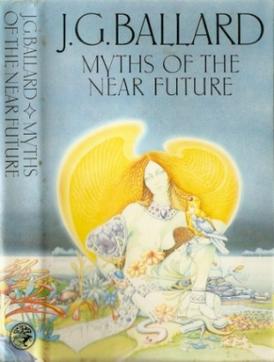
Myths of the Near Future is a collection of science fiction short stories by British writer J. G. Ballard, first published in 1982.
Stanley Edgar Hyman was an American literary critic who wrote primarily about critical methods: the distinct strategies critics use in approaching literary texts. He was the husband of writer Shirley Jackson.
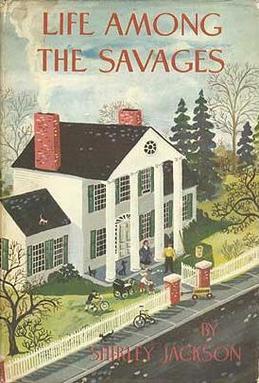
Life Among the Savages is a collection of short stories edited into novel form, written by Shirley Jackson. Originally these stories were published individually in women's magazines such as Good Housekeeping, Woman's Day, Mademoiselle, and others. Published in 1952, Life Among the Savages is a moderately fictionalised memoir of the author's life with her own four children, an early work in what Laura Shapiro calls "the literature of domestic chaos".

The Night Listener is a 2006 American psychological thriller film directed by Patrick Stettner and starring Robin Williams. The screenplay by Armistead Maupin, Terry Anderson, and Stettner is based on Maupin's 2000 novel The Night Listener, which was inspired by Anthony Godby Johnson.
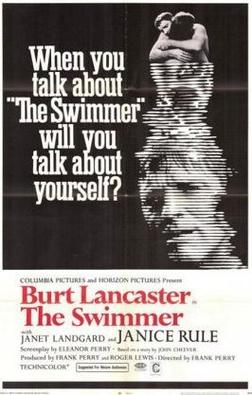
The Swimmer is a 1968 American surrealist-drama film starring Burt Lancaster. The film was written and directed by Academy Award-nominated husband-and-wife team of Eleanor Perry and Frank Perry (director). The story is based on the 1964 short story "The Swimmer" by John Cheever, which appeared in the July 18, 1964, issue of The New Yorker. The 95-minute movie adds new characters and scenes consistent with those in the original 12-page short story.
The Example is a Caroline era stage play, a comedy written by James Shirley, first published in 1637. The play has repeatedly been acclaimed both as one of Shirley's best comedies and one of the best works of its generation. And it provides one of the clearest demonstrations in Shirley's canon of the influence of the works of Ben Jonson on the younger dramatist's output.
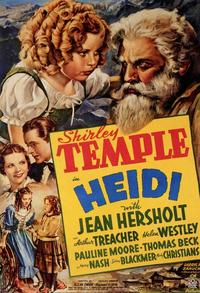
Heidi is a 1937 American musical drama film directed by Allan Dwan and written by Julien Josephson and Walter Ferris, loosely based on Johanna Spyri's 1880 children's book of the same name. The film stars Shirley Temple as the titular orphan, who is taken from her grandfather to live as a companion to Klara, a spoiled, disabled girl. It was a success and Temple enjoyed her third consecutive year as number one box office draw.

Flash of Genius is a 2008 American biographical drama film directed by Marc Abraham. Philip Railsback wrote the screenplay based on a 1993 New Yorker article by John Seabrook. The story focuses on Robert Kearns and his legal battle against the Ford Motor Company after they developed an intermittent windshield wiper based on ideas the inventor had patented. The film's title comes from the phrase "flash of genius", which is patent law terminology that was in effect from 1941 to 1952, although Kearns's patent was filed in 1964; it held that the inventive act must come into the mind of an inventor as a kind of epiphany, and not as the result of tinkering.
Paths to Freedom was a popular comedy on the Irish television network RTÉ Two. The shows stars two characters, Jeremy and Rats, who have both recently been released from a Dublin prison. The show takes the format of a mockumentary, with a fly-on-the-wall camera crew following the two characters, who are from thoroughly different backgrounds, as they try to reintegrate back into society. There were six episodes of the show produced, the first airing on 13 November 2000, and the final episode airing one month later. The series was followed-up by a movie based on the character Rats, Spin the Bottle.
"Lines of Fire" is an episode of the seventh season of the American police drama television series Homicide: Life on the Street. It originally aired on NBC on May 7, 1999. The episode was written by James Yoshimura and directed by Kathryn Bigelow.
On July 19, 2010, Shirley Sherrod was fired from her appointed position as Georgia State Director of Rural Development for the United States Department of Agriculture. Her firing was an administration reaction to media reports on video excerpts from her address to an event of the National Association for the Advancement of Colored People in March 2010 and commentary posted by conservative blogger Andrew Breitbart on his website. Based on these excerpts, the NAACP condemned Sherrod's remarks as racist and US government officials called on the official to resign. However, review of her full speech showed that the excerpts had been selectively edited, and that her remarks – understood in context – were about the importance of overcoming personal prejudices. The NAACP and White House officials then apologized for their earlier criticisms, and United States Secretary of Agriculture Tom Vilsack apologized for the firing and offered Sherrod a new position.

Murray William Sayle was an Australian journalist, novelist and adventurer.

We Have Always Lived in the Castle is a 1962 mystery novel by American author Shirley Jackson. It was Jackson's final work, and was published with a dedication to Pascal Covici, the publisher, three years before the author's death in 1965. The novel is written in the voice of eighteen-year-old Mary Katherine "Merricat" Blackwood, who lives with her agoraphobic sister and ailing uncle on an estate. Six years before the events of the novel, the Blackwood family experienced a tragedy that left the three survivors isolated from their small village.

Shirley is a 2020 American biographical drama film directed by Josephine Decker and written by Sarah Gubbins, based on the 2014 novel of the same name by Susan Scarf Merrell, which formed a "largely fictional story" around novelist Shirley Jackson during the time period she was writing her 1951 novel Hangsaman. The film stars Elisabeth Moss as Jackson, with Michael Stuhlbarg, Odessa Young, and Logan Lerman in supporting roles. Martin Scorsese serves as an executive producer.
"Like Mother Used to Make" is a short story by Shirley Jackson. It was originally published in the 1949 short story collection The Lottery and Other Stories by publisher Farrar, Straus and Giroux. It contains the second appearance of James Harris, a recurring character in the collection.

Just An Ordinary Day is a posthumous collection of short stories by American writer Shirley Jackson, first published in 1996 by Bantam Books.










